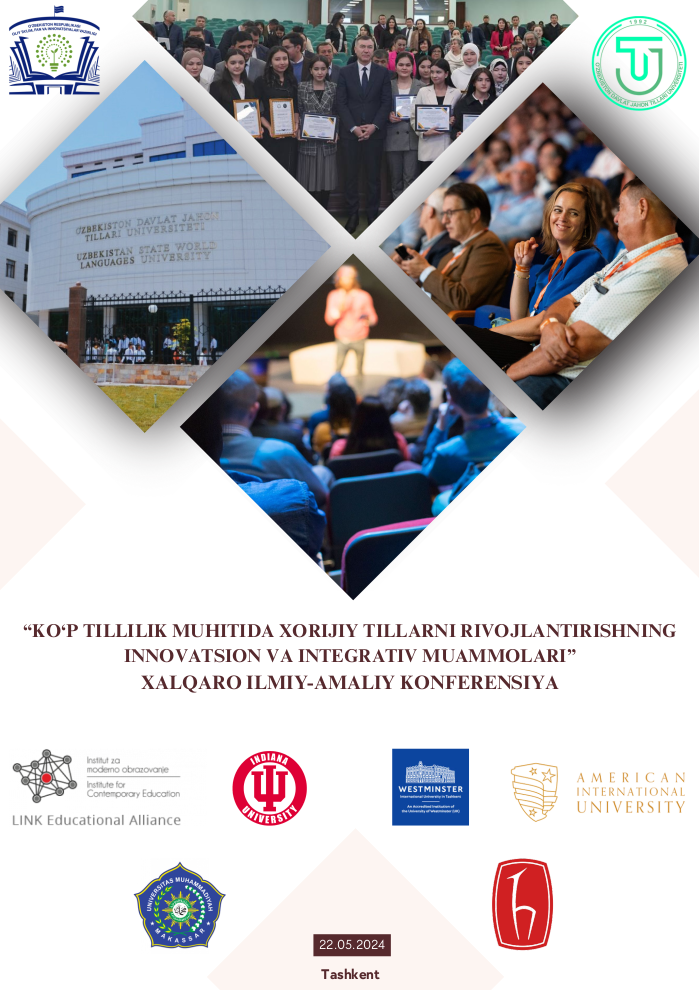Constructivist approach in EFL classrooms (a case study a higher education in Indonesia)
https://doi.org/10.5281/zenodo.11256737
Kalit so‘zlar
Constructivist Approach, EFL Classrooms, Case StudyAnnotasiya
The study adopts a qualitative research design, which aligns with the constructivist paradigm. The research employs an exploratory approach to gain in-depth insights into the constructivist approach's implementation in EFL classrooms. The
participants in the study are EFL learners and lecturers from a higher education institutions in Indonesia. The sample is selected using purposive sampling. Semi-structured interviews are conducted with EFL lecturers to gain their perspectives on the use of the constructivist approach in the classroom. The researchers observe EFL classrooms where the constructivist approach is implemented. The qualitative data gathered from interviews, classroom observations, and student surveys are transcribed and analyzed using thematic analysis. This study confirms that impact of the constructivist approach in EFL Classrooms in a Higher Education in Indonesia has been positive overall. It has contributed to a more student-centered and interactive learning environment, fostering greater engagement, autonomy, and critical thinking skills among EFL learners.
Foydalanilgan adabiyotlar ro‘yhati
Albiladi, W. S. (2019). Teaching English pronunciation revisited: the challenges of teaching EFL in non-English-speaking countries. European Journal of Foreign Language Teaching.
Blumberg, P. (2016). Assessing implementation of learner-centered teaching while providing faculty development. College Teaching, 64(4), 194-203.
Bonk, C. J., & King, K. S. (2012). Searching for learner-centered, constructivist, and sociocultural components of collaborative educational learning tools. In Electronic collaborators (pp. 61-86). Routledge.
Braun, V., & Clarke, V. (2006). Using thematic analysis in psychology. Qualitative Research in Psychology, 3(2), 77-101.
Cai, Y., Pan, Z., & Liu, M. (2022). Augmented reality technology in language learning: A meta‐analysis. Journal of Computer Assisted Learning, 38(4), 929-945.
Casas Jr, E., Pormon, M., Manus, J., & Lejano, R. (2021). Relationality and resilience: Environmental education in a time of pandemic and climate crisis. The Journal of Environmental Education, 52(5), 314-324.
Creswell, J. W. (2012). Educational research: planning, conducting, and evaluating quantitative and qualitative research. Pearson Education, Inc.
Darsih, E. (2018). Learner-centered teaching: What makes it effective. Indonesian EFL Journal, 4(1), 33-42.
de Soto, J. A. (2022a). The Constructivism of Social Discourse: Toward a Contemporaneous Understanding of Knowledge. Scientific Research, an Academic Publisher (OJPP), 12(3).
de Soto, J. A. (2022b). Constructivism of Social Discourses. Scientific Research, OJPP, 12(3).
Farooq, M. U. (2015). Creating a Communicative Language Teaching Environment for Improving Students' Communicative Competence at EFL/EAP University Level. International Education Studies, 8(4), 179-191.
Jeong, K.-O. (2019). Online collaborative language learning for enhancing learner motivation and classroom engagement. International Journal of Contents, 15(4), 89-96.
Kladder, J. R. (2019). Learner-centered teaching: Alternatives to the established norm. In The Learner-Centered Music Classroom (pp. 1-17). Routledge.
Kozlova, N. Y. (2023). Imagery in Scientific Discourse. RUDN Journal of Philosophy, 27(1), 138-152.
Lai, C., Shum, M., & Tian, Y. (2016). Enhancing learners’ self-directed use of technology for language learning: The effectiveness of an online training platform. Computer Assisted Language Learning, 29(1), 40-60.
Liu, S. H.-J., & Lan, Y.-J. (2016). Social constructivist approach to web-based EFL learning: Collaboration, motivation, and perception on the use of Google Docs. Journal of Educational Technology & Society, 19(1), 171-186.
Matriano, E. A. (2020). Ensuring Student-Centered, Constructivist and Project-Based Experiential Learning Applying the Exploration, Research, Interaction and Creation (ERIC) Learning Model. International Online Journal of Education and Teaching, 7(1), 214-227.
Moate, R. M., & Cox, J. A. (2015). Learner-Centered Pedagogy: Considerations for application in a Didactic Course. Professional Counselor, 5(3), 379-389.
Ozverir, I., Osam, U. V., & Herrington, J. (2017). Investigating the effects of authentic activities on foreign language learning: A design-based research approach. Journal of Educational Technology & Society, 20(4), 261-274.
Paquette, K., & Trudel, P. (2018). Learner-centered coach education: Practical recommendations for coach development administrators. International Sport Coaching Journal, 5(2), 169-175.
Pitkänen, K., Iwata, M., & Laru, J. (2020). Exploring technology-oriented Fab Lab facilitators’ role as educators in K-12 education: Focus on scaffolding novice students’ learning in digital fabrication activities. International Journal of Child-Computer Interaction, 26, 100207.
Polly, D., Allman, B., Casto, A., & Norwood, J. (2017). Sociocultural perspectives of learning. Foundations of learning and instructional design technology.
Rao, Z., & Lei, C. (2014). Teaching English as a foreign language in Chinese universities: The present and future: An appropriate way to teach English in China is to balance teaching activities for elaborating linguistic details and developing students’ communicative competence. English Today, 30(4), 40-45.
Rhim, H. C., & Han, H. (2020). Teaching online: foundational concepts of online learning and practical guidelines. Korean journal of medical education, 32(3), 175.
Sadik, A. (2008). Digital storytelling: A meaningful technology-integrated approach for engaged student learning. Educational technology research and development, 56, 487-506.
Sehlaoui, A. S. (2001). Developing cross-cultural communicative competence in pre-service ESL/EFL teachers: A critical perspective. Language Culture and Curriculum, 14(1), 42-57.
Shadaan, P., & Leong, K. E. (2013). Effectiveness of Using GeoGebra on Students' Understanding in Learning Circles. Malaysian Online Journal of Educational Technology, 1(4), 1-11.
Shah Ph, D., & Kumar, R. (2019). Effective constructivist teaching learning in the classroom. Shah, RK (2019). Effective Constructivist Teaching Learning in the Classroom. Shanlax International Journal of Education, 7(4), 1-13.
Talley, P. C., & Hui-Ling, T. (2014). Implicit and explicit teaching of English speaking in the EFL classroom. International Journal of Humanities and Social Science, 4(6), 38-45.
Wang, Y.-C. (2014). Using wikis to facilitate interaction and collaboration among EFL learners: A social constructivist approach to language teaching. System, 42, 383-390.

